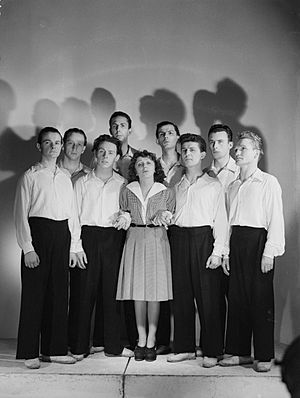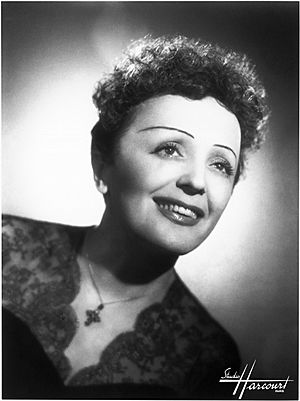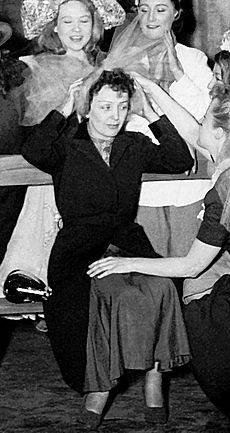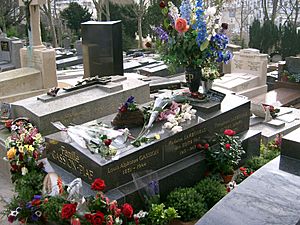Édith Piaf facts for kids
Quick facts for kids
Édith Piaf
|
|
|---|---|
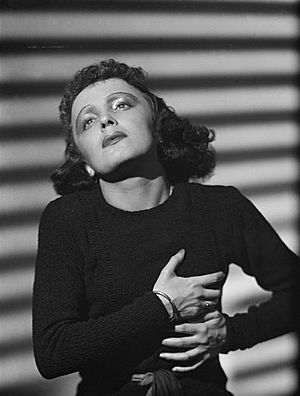
Piaf in 1939
|
|
| Background information | |
| Birth name | Édith Giovanna Gassion |
| Also known as | La Môme Piaf (The Little Sparrow) |
| Born | 19 December 1915 Paris, France |
| Died | 10 October 1963 (aged 47) Plascassier, Grasse, France |
| Genres |
|
| Occupations |
|
| Years active | 1935–1963 |
| Labels |
|
| Associated acts |
|
Édith Piaf (born Édith Giovanna Gassion, December 19, 1915 – October 10, 1963) was a famous French singer and actress. She was known as France's national singer, or "chanteuse." Piaf became one of the most recognized international stars from her country.
Her songs often told stories from her own life. She sang emotional ballads about love, loss, and sadness. Some of her most famous songs include "La Vie en rose" (1946), "Non, je ne regrette rien" (1960), and "Hymne à l'amour" (1949). Since her death, many books and movies have been made about her life. One popular film is La Vie en rose from 2007. Édith Piaf is still celebrated as one of the greatest performers of the 20th century.
Contents
Early Life and Family
Édith Giovanna Gassion was born in Belleville, Paris, on December 19, 1915. She was named Édith after Edith Cavell, a British nurse from World War I. The nickname "Piaf" means "sparrow" in French slang. She received this nickname later in her career.
Édith's father, Louis Alphonse Gassion, was an acrobat who performed on the streets. Her mother, Annetta Giovanna Maillard, was also a singer and circus performer.
When Édith was born, her mother left her. She lived for a short time with her grandmother. Later, her father took her to live with his mother in Bernay, Normandy. From ages three to seven, Édith had trouble seeing. She believed her sight returned after a special trip to honor Saint Thérèse of Lisieux.
In 1929, at age 14, Édith joined her father's street performances. This is when she first started singing in public. She later met Simone Berteaut, who became a close friend. They sang together on the streets of Paris to earn money. Édith had a daughter named Marcelle in 1933.
Singing Career
In 1935, a nightclub owner named Louis Leplée discovered Piaf in Paris. His club, Le Gerny's, was popular with all kinds of people. Édith was very shy and small, only 142 cm (4 feet 8 inches) tall. This led Leplée to give her the nickname La Môme Piaf, meaning "The Little Sparrow." He taught her how to perform on stage. Her simple black dress became her famous look.
Her first performances were a big success. Many famous people came to see her, including singer Maurice Chevalier. She soon made her first two records. After Leplée passed away, Édith faced some challenges. To help her career, she worked with Raymond Asso. He changed her stage name to "Édith Piaf." He also helped her find songs that reflected her life story.
In 1940, Piaf acted in a play called Le Bel Indifférent. Even during the German occupation of Paris, her career continued to grow. She became friends with important people. She wrote the words for many of her songs. In 1944, she started working with Yves Montand at the Moulin Rouge. She helped him become a very famous singer in France.
After World War II, Piaf became famous around the world. She toured Europe, the United States, and South America. She helped start the career of Charles Aznavour in the early 1950s. At first, American audiences were not sure what to think of her simple style. But after a great review in the New York Herald Tribune, her popularity grew. She appeared on The Ed Sullivan Show many times and performed at Carnegie Hall.
Piaf wrote and sang her signature song, "La Vie en rose", in 1945. This song was so important that it won a Grammy Hall of Fame Award in 1998.
She became very famous at the Paris Olympia music hall. She performed many concerts there between 1955 and 1962. These concerts helped save the venue from closing. In 1961, she first sang "Non, je ne regrette rien" at the Olympia. Her last song, "L'Homme de Berlin," was recorded in April 1963.
Role During World War II
Édith Piaf's career continued to grow during the German occupation of France. She was even invited to perform in Berlin. She was able to afford a nice apartment in Paris.
After the war, some people questioned her actions during the occupation. However, her secretary, Andrée Bigard, who was part of the French Resistance, spoke up for her. Bigard said that Piaf performed at prisoner-of-war camps in Germany. She also helped many prisoners escape. Piaf was popular with German officials, which allowed her to help people in need. For example, she helped a Jewish musician named Michel Emer get to safety in France. By December 1944, Piaf was back on stage, performing for the Allied forces.
Personal Life
Édith Piaf had one daughter, Marcelle, who passed away when she was young. Piaf did not have any other children.
The love of Piaf's life was a boxer named Marcel Cerdan. He died in a plane crash in October 1949 while traveling to meet her in New York City. Their relationship was well-known around the world.
Piaf was in several car crashes that affected her health. She married her first husband, Jacques Pills, in 1952. Famous actress Marlene Dietrich was her maid of honor. They divorced in 1957. In 1962, she married Théo Sarapo, a singer and actor who was 20 years younger than her. They sang together in some of her last shows.
Piaf lived in different parts of Paris and nearby towns throughout her life.
Death and Legacy
Édith Piaf's health suffered from various illnesses and the effects of her car accidents. She passed away at age 47 on October 10, 1963, at her home in Plascassier, France.
It is said that her husband, Théo Sarapo, secretly drove her body back to Paris. This was so her fans would believe she died in her hometown. Her friend, writer Jean Cocteau, reportedly passed away the very next day after hearing the news of her death.
Édith Piaf is buried in Père Lachaise Cemetery in Paris. Her grave is a very popular place for visitors. Her daughter Marcelle, her father, and her second husband Théo Sarapo are buried with her.
Even though she was not given a traditional church funeral at the time, tens of thousands of people came to her funeral procession in Paris. More than 100,000 fans attended the ceremony at the cemetery. Charles Aznavour said that Piaf's funeral was the only time Parisian traffic completely stopped since the end of World War II. In 2013, 50 years after her death, the Roman Catholic Church held a special memorial service for her.
Since her death, French media has continued to celebrate her life. There are many magazines, books, plays, TV shows, and films about her. In 1973, the Association of the Friends of Édith Piaf was formed. In 1981, a square in Belleville, Paris, was named Place Édith Piaf. A small planet was also named 3772 Piaf in her honor.
In Paris, there is a museum dedicated to her called the Musée Édith Piaf. In 2015, a concert was held in New York City to celebrate the 100th anniversary of her birth.
Films about Piaf
Many films and plays have been made about Édith Piaf's life:
- Piaf (1974), which showed her early years.
- Piaf (1978), a play by Pam Gems.
- Édith et Marcel (1983), about her relationship with Marcel Cerdan.
- La Vie en rose (2007), directed by Olivier Dahan. Marion Cotillard won an Academy Award for Best Actress for playing Piaf in this film.
Songs Discography
- 1933
- Entre Saint-Ouen et Clignancourt
- 1934
- L'Étranger
- 1935
- Mon apéro
- La Java de Cézigue
- Fais-moi valser
- 1936
- Les Mômes de la cloche
- J'suis mordue
- Mon légionnaire
- Le Contrebandier
- La Fille et le chien
- La Julie jolie
- Va danser
- Chand d'habits
- Reste
- Les Hiboux
- Quand même
- La Petite boutique
- Y'avait du soleil
- Il n'est pas distingué
- Les Deux ménétriers
- Mon amant de la coloniale
- C'est toi le plus fort
- Le Fanion de la légion
- J'entends la sirène
- Ding, din, dong
- Madeleine qu'avait du cœur
- Les Marins ça fait des voyages
- Simple comme bonjour
- Le Mauvais matelot
- Celui qui ne savait pas pleurer
- 1937
- Le Grand Voyage du pauvre Nègre
- Un jeune homme chantait
- Tout fout le camp
- Ne m'écris pas
- Partance
- Dans un bouge du Vieux Port
- Mon cœur est au coin d'une rue
- 1938
- С'est lui que mon cœur a choisi
- Paris-Méditerranée
- La Java en mineur
- Browning
- Le Chacal
- Corrèqu' et réguyer
- 1939
- Y'en a un de trop
- Elle fréquentait la rue Pigalle
- Le Petit Monsieur triste
- Les Deux Copains
- Je n'en connais pas la fin
- 1940
- Embrasse-moi
- On danse sur ma chanson
- Sur une colline
- C'est la moindre des choses
- Escale
- L'Accordéoniste
- 1941
- Où sont-ils, mes petits copains?
- C'était un jour de fête
- C'est un monsieur très distingué
- J'ai dansé avec l'Amour
- Tu es partout
- L'Homme des bars
- Le Vagabond
- 1942
- Jimmy, c'est lui
- Un coin tout bleu
- Sans y penser
- Un monsieur me suit dans la rue
- 1943
- J'ai qu'à l'regarder...
- Le Chasseur de l'hôtel
- C'était une histoire d'amour
- Le Brun et le Blond
- Monsieur Saint-Pierre
- Coup de Grisou
- De l'autre côté de la rue
- La Demoiselle du cinqième
- C'était si bon
- Je ne veux plus laver la vaisselle
- La Valse de Paris
- Chanson d'amour
- Ses mains
- 1944
- Les deux rengaines
- Y'a pas d'printemps
- Les Histoires de coeur
- C'est toujours la même histoire
- 1945
- Le Disque usé
- Elle a...
- Regarde-moi toujours comme ça
- Les Gars qui marchaient
- Il Riait
- Monsieur Ernest a réussi
- 1946
- La Vie en rose
- Les trois cloches (with Les Compagnons de la chanson)
- Dans ma rue
- J'm'en fous pas mal
- C'est merveilleux
- Adieu mon cœur
- Le Chant du pirate
- Céline (with Les Compagnons de la Chanson)
- Le petit homme
- Le Roi a fait battre tambour (with Les Compagnons de la Chanson)
- Dans les prisons de Nantes (with Les Compagnons de la Chanson)
- Elle chantait (with Les Compagnons de la Chanson)
- Mariage
- Un refrain courait dans la rue
- Miss Otis Regrets
- Il est né, le divin enfant
- 1947
- C'est pour ça
- Qu'as-tu fait John?
- Sophie
- Mais qu'est-ce que j'ai ?
- Le Geste
- Si tu partais
- Une chanson à trois temps
- Un Homme comme les autres
- Les Cloches sonnent
- Johnny Fedora et Alice Blue Bonnet
- Le Rideau tombe avant la fin
- Elle avait son sourire
- 1948
- Monsieur Lenoble
- Les Amants de Paris
- Il a chanté
- Les vieux bateaux
- Il pleut
- Cousu de fil blanc
- Amour du mois de mai
- Monsieur X
- 1949
- Bal dans ma rue
- Pour moi tout' seule
- Pleure pas
- Le Prisonnier de la tour (Si le roi savait ça Isabelle)
- L'Orgue des amoureux
- Dany
- Paris
- 1950
- Hymne à l'amour
- Le Chevalier de Paris
- Il fait bon t'aimer
- La p'tite Marie
- Tous les amoureux chantent
- Il y avait
- C'est d'la faute à tes yeux
- C'est un gars
- Hymn to Love
- Autumn Leaves
- The Three Bells
- Le Ciel est fermé
- La Fête continue
- Simply a Waltz
- La Vie en rose (English version)
- 1951
- Padam, padam...
- Avant l'heure
- L'homme que j'aimerai
- Du matin jusqu'au soir
- Demain (Il fera jour)
- C'est toi (with Eddie Constantine)
- Rien de rien
- Si, si, si, si (with Eddie Constantine)
- À l'enseigne de la fille sans cœur
- Télégramme
- Une enfant
- Plus bleu que tes yeux
- Le Noël de la rue
- La Valse de l'amour
- La Rue aux chansons
- Jezebel
- Chante-moi (with M. Jiteau)
- Chanson de Catherine
- Chanson bleue
- Je hais les dimanches
- 1952
- Au bal de la chance
- Elle a dit
- Notre-Dame de Paris
- Mon ami m'a donné
- Je t'ai dans la peau
- Monsieur et madame
- Ça gueule ça, madame (with Jacques Pills)
- 1953
- Bravo pour le clown
- Sœur Anne
- N'y va pas Manuel
- Les Amants de Venise
- L'effet qu'tu m'fais
- Johnny, tu n'es pas un ange
- Jean et Martine
- Et moi...
- Pour qu'elle soit jolie ma chanson (with Jacques Pills)
- Les Croix
- Le bel indifférent
- Heureuse
- 1954
- La Goualante du pauvre jean
- Enfin le printemps
- Retour
- Mea culpa
- Le "Ça ira"
- Avec ce soleil
- L'Homme au piano
- Sérénade du Pavé
- Sous le ciel de Paris
- 1955
- Un grand amour qui s'achève
- Miséricorde
- C'est à Hambourg
- Légende
- Le Chemin des forains
- La Vie en rose (Spanish)
- 1956
- Heaven Have Mercy
- One Little Man
- 'Cause I Love You
- Chante-Moi (English)
- Don't Cry
- I Shouldn't Care
- My Lost Melody
- Avant nous
- Et pourtant
- Marie la Française
- Les amants d'un jour
- L'Homme à la moto
- Soudain une vallée
- Une dame
- Toi qui sais
- 1957
- La Foule
- Les Prisons du roy
- Opinion publique
- Salle d'attente
- Les Grognards
- Comme moi
- 1958
- C'est un homme terrible
- Je me souviens d'une chanson
- Je sais comment
- Tatave
- Les Orgues de barbarie
- Eden Blues
- Le Gitan et la fille
- Fais comme si
- Le Ballet des cœurs
- Les Amants de demain
- Les Neiges de Finlande
- Tant qu'il y aura des jours
- Un étranger
- Mon manège à moi
- 1959
- Milord
- T'es beau, tu sais
- 1960
- Non, je ne regrette rien
- La Vie, l'amour
- Rue de Siam
- Jean l'Espagnol
- La belle histoire d'amour
- La Ville inconnue
- Non, la vie n'est pas triste
- Kiosque à journaux
- Le Métro de Paris
- Cri du cœur
- Les Blouses blanches
- Les Flons-Flons du bal
- Les Mots d'amour
- T'es l'homme qu'il me faut
- Mon Dieu
- Boulevard du crime
- C'est l'amour
- Des histoires
- Ouragan
- Je suis à toi
- Les Amants merveilleux
- Je m'imagine
- Jérusalem
- Le vieux piano
- 1961
- C'est peut-être ça
- Les bleuets d'azur
- Quand tu dors
- Mon vieux Lucien
- Le Dénicheur
- J'n'attends plus rien
- J'en ai passé des nuits
- Exodus
- Faut pas qu'il se figure
- Les Amants (with Charles Dumont)
- No Regrets
- Le Billard électrique
- Marie-Trottoir
- Qu'il était triste cet anglais
- Toujours aimer
- Mon Dieu (English version)
- Le Bruit des villes
- Dans leur baiser
- 1962
- Le Droit d'aimer
- À quoi ça sert l'amour (with Théo Sarapo)
- Fallait-il
- Une valse
- Inconnu excepte de dieu (with Charles Dumont)
- Quatorze Juillet
- Les Amants de Teruel (with Mikis Theodorakis/Jacques Plante)
- Roulez tambours
- Musique à tout va
- Le Rendez-vous
- Toi, tu l'entends pas!
- Carmen's Story
- On cherche un Auguste
- Ça fait drôle
- Emporte-moi
- Polichinelle
- Le petit brouillard (Un petit brouillard)
- Le Diable de la Bastille
- 1963
- C'était pas moi
- Le Chant d'amour
- Tiens, v'là un marin
- J'en ai tant vu
- Traqué
- Les Gens
- Margot cœur gros
- Monsieur Incognito
- Un Dimanche à Londres (with Théo Sarapo)
- L'Homme de Berlin (her last recording)
Filmography
- La garçonne (1936), Jean de Limur
- Montmartre-sur-Seine (1941), Georges Lacombe
- Star Without Light (1946), Marcel Blistène
- Neuf garçons, un cœur (1947), Georges Freedland
- Paris Still Sings (1951), Pierre Montazel
- Boum sur Paris (1953), Maurice de Canonge
- Si Versailles m'était conté (1954), Sacha Guitry
- French Cancan (1954), Jean Renoir
- Música de Siempre (1958), sang "La vida en rosa", the Spanish version of "La Vie en rose".
- Les Amants de demain (1959), Marcel Blistène
Theatre Credits
- Le Bel Indifférent (1940), Jean Cocteau
Discography
These are collections of Piaf's songs, not original releases:
- Edith Piaf: Edith Piaf (Music For Pleasure MFP 1396) 1961
- Ses Plus Belles Chansons (Contour 6870505) 1969
- The Voice of the Sparrow: The Very Best of Édith Piaf, original release date: June 1991
- Édith Piaf: 30th Anniversaire, original release date: April 5, 1994
- Édith Piaf: Her Greatest Recordings 1935–1943, original release date: July 15, 1995
- The Early Years: 1938–1945, Vol. 3, original release date: October 15, 1996
- Hymn to Love: All Her Greatest Songs in English, original release date: November 4, 1996
- Gold Collection, original release date: January 9, 1998
- The Rare Piaf 1950–1962 (April 28, 1998)
- La Vie en rose, original release date: January 26, 1999
- Montmartre Sur Seine (soundtrack import), original release date: September 19, 2000
- Éternelle: The Best Of (January 29, 2002)
- Love and Passion (boxed set), original release date: April 8, 2002
- The Very Best of Édith Piaf (import), original release date: October 29, 2002
- 75 Chansons (Box set/import), original release date: September 22, 2005
- 48 Titres Originaux (import), (09/01/2006)
- Édith Piaf: L'Intégrale/Complete 20 CD/413 Chansons, original release date: February 27, 2007
- Édith Piaf: The Absolutely Essential 3 CD Collection/Proper Records UK, original release date: May 31, 2011
On DVD
- Édith Piaf: A Passionate Life (May 24, 2004)
- Édith Piaf: Eternal Hymn (Éternelle, l'hymne à la môme, PAL, Region 2, import)
- Piaf: Her Story, Her Songs (June 2006)
- Piaf: La Môme (2007)
- La Vie en rose (biopic, 2007)
- Édith Piaf: The Perfect Concert and Piaf: The Documentary (February 2009)
Images for kids
See Also
 In Spanish: Édith Piaf para niños
In Spanish: Édith Piaf para niños
- Music of France
- French popular music
 | Isaac Myers |
 | D. Hamilton Jackson |
 | A. Philip Randolph |


